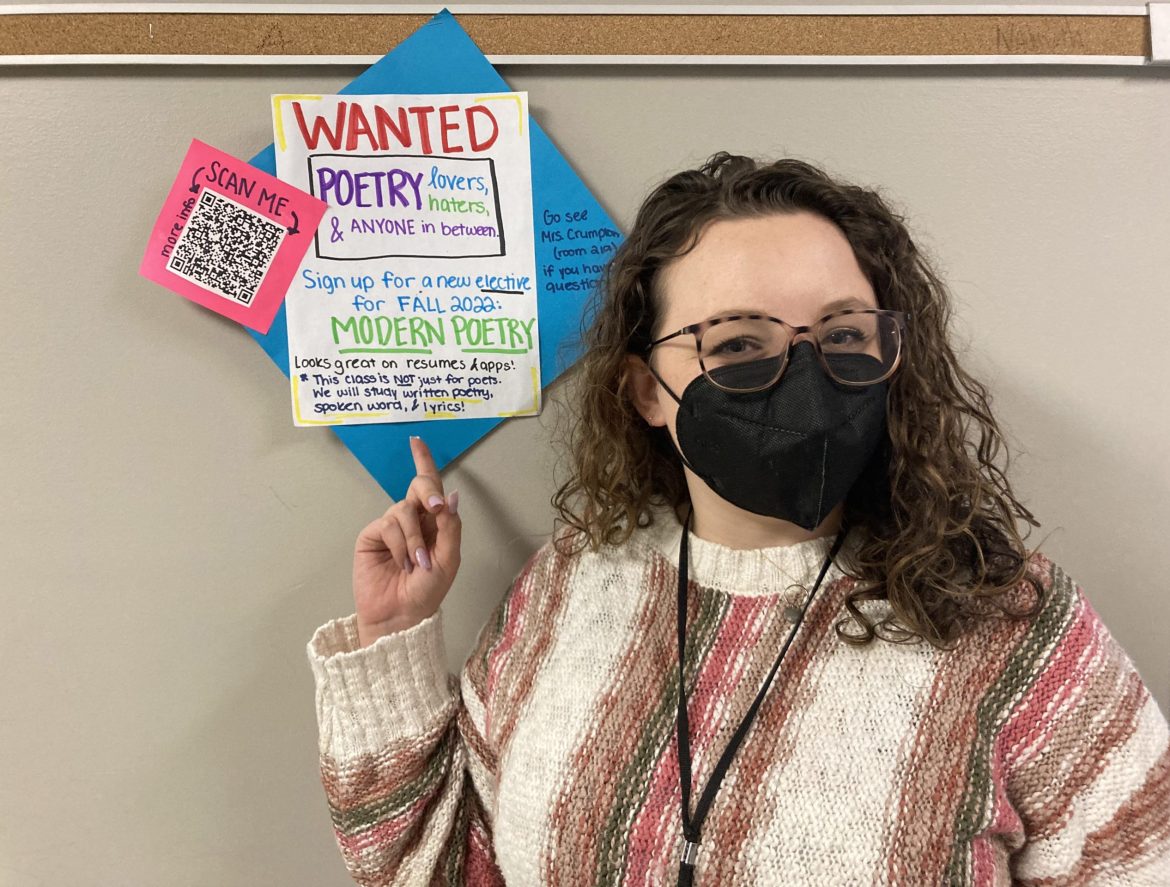English department teacher Grace Crumpton poses next to a poster for her new English class Contemporary Literature, which will focus on modern poetry. Crumpton began to plan the class out during the 2021-22 school year, and is excited to teach it. “I began thinking about it last year, and suggested the idea to some of my colleagues, who encouraged me to flesh it out a little more in terms of who some of the products could be, what some of the assignment would look like, what in-class would look like,” Crumpton said. Photo by Natalie Schliekelman
Digital Managing Editor Natalie Schliekelman talks with English department teacher Grace Crumpton about her new Contemporary Literature class, which will focus on modern poetry.
Digital Managing Editor Natalie Schliekelman: Can you tell me about the poetry class you’ll be teaching?
English department teacher Grace Crumpton: Next year we’re gonna have a class called Contemporary Literature that’s going to focus on modern poetry. We’ll be studying poetry in all its forms, including written poetry, spoken word and lyrics. Specifically there will be a focus on poetry as a tool for healing.

An infographic shows one of the poets who will be highlighted in English department teacher Grace Crumpton’s Contemporary Literature class.
GC: I think that a lot of people get the idea through education that poetry is stuffy and confusing and something that exists for only certain people. And I would like to allow kids an opportunity to dismantle that idea by making poetry their own, by finding poetry that they love and by contributing to poetry itself.
NS: What’s your plan for the curriculum?
GC: I want to get information from students before I make too many decisions in order to make (the class) exactly what will benefit them. That said, I know we’re going to study several different kinds of poetry. I do think we’re going to bring in a small unit on children’s poetry to talk about why that’s so formative and how we somehow got from loving poetry and rhyming books as children to hating it as adults or young adults. We’ll also be studying some collections so that we can look at trends in poetry, different poetic genres, different styles, comparing those as well as analyzing themes across poetry. So maybe we find poems from five different decades or different styles, but all around one theme so that we can talk about those together. Also, we (will be studying) novels in verse.

An infographic shows one of the poets who will be highlighted in English department teacher Grace Crumpton’s Contemporary Literature class.
GC: One of the biggest things I’m excited about is asking everyone for examples. I’ve sent emails to other English teachers, and to a lot of people I know who like poetry and ask them for their favorite poets because there are so many out there. Every time someone gives me a recommendation I just add it to a list and then this summer I’m going to spend a lot of time sitting down compiling everything, but I definitely want it to be showing a wide range of human perspective. I’m also excited to have kids research and bring in their own poetry.
NS: Are you planning to have students write their own poetry?
GC: Yes, definitely. All types. I love to use mentor poems. Like if you have a favorite songwriter, or poet. We can take a piece that you love, and turn that into a template for you to model your with your own poetry. Because some kids don’t know that they’re good at it yet, and they need that structure to start with, whereas other kids don’t do well with structure and they’ll have the freedom to completely experiment. So we’re going to be trying a bunch of different things and hopefully sharing poetry with each other about once a week.

An infographic shows one of the poets who will be highlighted in English department teacher Grace Crumpton’s Contemporary Literature class.
GC: I won a grant that I wrote a proposal for, specifically for poetry books. Instead of buying a whole class set of a few books, I’m gonna buy a few sets of lots of books, so that students can share and have access to more books. So anthologies of different kinds of poetry, as well as collections by one author, and versed novels.
NS: What do you think students will learn about poetry or what do you hope they’ll learn in your class?
GC: I hope they’ll see that it—just like any other kind of art—is accessible and something that they can have ownership of in that. They don’t have to like all of it or agree with all of it. You know, they get to be consumers and creators of poetry, and I just hope that it opens a new field of expression. It helps so much with critical thinking as well, like it’s just emotional regulation. So I hope that it can become a tool that’s good for them in their lives and that gives them something they feel competent and confident with.

An infographic shows one of the poets who will be highlighted in English department teacher Grace Crumpton’s Contemporary Literature class.
NS: What would you say to a student who’s considering taking the class next year?
GC: Come join us! I think that one thing I’m really excited about is to allow the class to be whatever students need it to be. Obviously, I have a structure in mind, but students often have such great ideas that I’m just really excited for their input in the class.
More from Natalie Schliekelman
